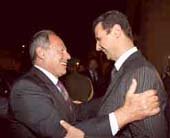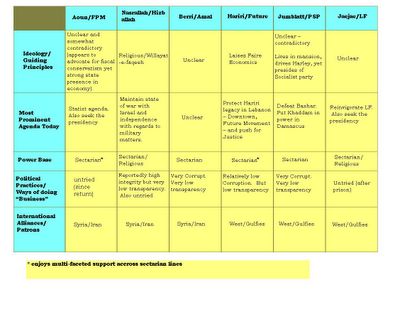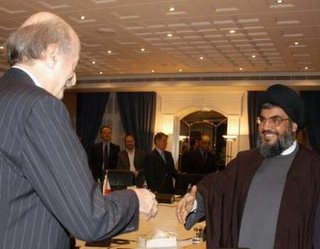All this silence on my part...because there is really nothing to write about on Lebanon from this part of the world...
I wonder what all these politicians meeting for the
n-teenth time around a round table dubbed a national dialogue do for a living. Really? Have we ever asked ourselves this question. They have so much spare time on them, so much time, to schedule a meeting after another that garners absolutely no tangible results.
And why are we waiting for them to come up with a verdict about our country's future and fate? Sometimes I give up suddenly on politics, even when public policy and politics are what I do for a living.
I've been silent, thinking, trying to answer questions about the way I should view my country. Do I go back to the way I used to be, namely back during the "Syrian tutelage era", where I used to focus on the positive, try to look for ways to improve the country through economic development, trade, and institutional reform, while shunning away the "foreign" and "defense" policies and sweeping them under the carpet because we as Lebanese do not have the power to affect them in any way.
Or do I just become like a Lebanese expatriate, namely give up on Lebanon altogether, except for listening to Fairuz, visiting my family during the vacations, and fantasizing about eating
mezze and
kibbeh up in beautiful Ehden while listening to the waters running in
Nabeh Mar Sarkis. And why am I even talking about Lebanese expatriates, when there are Lebanese living in Lebanon who just survive and live and manage to never watch the news?
I'm afraid of losing hope in my country. For the past year or so, I became interested in Lebanon's "foreign" and "defense" policies because I thought that the Lebanese people for the first time would get the chance to make a difference there. But I'm losing that hope a bit by bit and I'm left confused.
It's taking me time to move away from following the political news religiously to focusing on news items that never get talked about much, issues that really matter to the Lebanese people, such as workforce development, economic development, trade, and business investment, health policy, education policy, environmental policy, social policy, and transparency, good governance, and state reform.
So there's a time lag here. It pains me to admit that I lost hope in the politics, but that's the truth of the matter. Life moves on; our politicians are still stuck in history, back in March 8, 2005 and March 14, 2005.
And I read that if in today's dialogue a verdict about the fate of the Presidency does not come to fruition, Geagea and Jumblatt might call for a return to the streets; I say: please, give us a break, we are not tools. And the same goes for all the other political parties, FPM, Hizbullah, Amal, among others.
I stopped caring about who should be our President. And why should I care when the people do not vote for the President? I don't have a say, therefore, I don't really care. I can back this person or the other, but at the end of the day, the decision will come from some political "leaders" whom I did not vote for because first I was not in Lebanon during election time, and second because for instance the member of Parliament who supposedly represents me, MP Mosbah Ahdab whom I respect his political stands, is not even included on the negotiating table. Oh, remind me, who made the decision about who should be there and should not? Ah, it's Berri! Well, too bad...
And why should I continue to watch the news or read it when I feel everyone is belittling our minds with the issue of the Shebaa Farms and the arms of the resistance? Again, some political leaders around a negotiating table will decide whether the Farms are half-Lebanese, half-Syrian, or all Lebanese, or all Syrian...they will also tell us whether the resistance arms are "holy" or not...and they will also tell us whether we will be "delineating" the borders with Syria or just simply "reaffirming" the borders with Syria (
tarsim versus
tahdid).
Anyways, my apologies for this sudden loss of optimism in our politics. Let's just focus on the positives, perhaps look forward to Beirut I...that should bring us tangible results more than the NATIONAL dialogue that is not "national" after all....
Update: Just read that the political leaders were deadlocked and decided to postpone the dialogue until Monday. Nabih Berri said that the Presidency issue needs to be resolved not through open sessions, but through behind-the-scenes dealings...Should this statement make us feel good?...
"Nobody knows how many rebellions, besides political rebellions, ferment in the masses of life which people earth."






